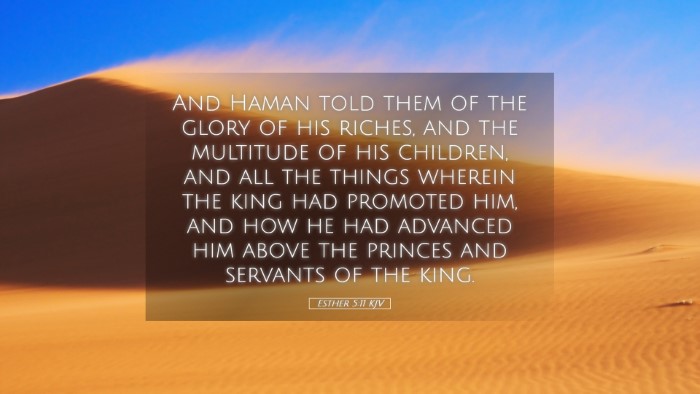Old Testament
Genesis Exodus Leviticus Numbers Deuteronomy Joshua Judges Ruth 1 Samuel 2 Samuel 1 Kings 2 Kings 1 Chronicles 2 Chronicles Ezra Nehemiah Esther Job Psalms Proverbs Ecclesiastes Song of Solomon Isaiah Jeremiah Lamentations Ezekiel Daniel Hosea Joel Amos Obadiah Jonah Micah Nahum Habakkuk Zephaniah Haggai Zechariah MalachiEsther 5:11
Esther 5:11 KJV
And Haman told them of the glory of his riches, and the multitude of his children, and all the things wherein the king had promoted him, and how he had advanced him above the princes and servants of the king.
Esther 5:11 Bible Commentary
Commentary on Esther 5:11
Esther 5:11 states, "And Haman told them of the glory of his riches, and the multitude of his children, and all the things wherein the king had promoted him, and how he had advanced him above the princes and servants of the king." This verse is rich in the themes of pride, the human condition, and the unfolding drama of divine providence. Below is a synthesis of insights drawn from public domain commentaries by Matthew Henry, Albert Barnes, and Adam Clarke.
Contextual Background
The events of Esther take place during the reign of King Ahasuerus (Xerxes I) of Persia. Esther, a Jewish orphan, has risen to queen, unbeknownst to the king that she is a Jewess. Haman, an Agagite, has been elevated to a position of great authority, and he plots against the Jews. This verse highlights Haman’s self-aggrandizement and sets the stage for the forthcoming conflict.
Analysis of Haman's Pride
Matthew Henry observes that Haman's recounting of his riches and honors showcases his egocentric character. His focus on personal glory indicates a profound pride, which is a central theme of his downfall. Haman’s monologue serves not only as a bragging point but as an indicator of the corruptive nature of power and the emptiness of worldly acclaim.
- Pride and Its Pitfalls: Haman desires recognition for his achievements and relies on his status for validation, revealing a profound spiritual and moral vacuum.
- Transitory Nature of Wealth: Commentators note that the emphasis on his riches serves as a reminder that material wealth is temporary and does not equate to true value or favor in the eyes of God.
Theological Implications
Albert Barnes emphasizes the contrast between worldly power and divine authority. Haman’s promotion above others might suggest success, but it is crucial to understand that the Lord's plans are ultimately sovereign, often overturning human expectations. Haman’s boastful nature highlights the futility of seeking fulfillment in material recognition.
- Divine Sovereignty: Haman's rise provides insight into God's ability to control seemingly adverse circumstances for His people’s ultimate good.
- Humility vs. Pride: The narrative invites reflection on the Christian call to humility, in stark contrast to Haman’s display of arrogance.
Human Dynamics in Leadership
Adam Clarke notes that Haman's interaction with his peers reflects the dynamics of power and jealousy. As he boasts of his standing and familial prospects, he inadvertently underscores the jealousy that often accompanies positions of influence. This exploration serves as a cautionary tale regarding the relational dynamics in leadership.
- Influence and Responsibility: Leaders are often weighed down by the burdens of envy and competition. Haman's behavior exemplifies how power can warp perceptions and distort character.
- Community Response: The verse implicitly asks how those in leadership can guide communities in healthy ways, avoiding the pitfalls that Haman embodies.
Practical Applications
The lessons from Esther 5:11 extend beyond the narrative to today's leaders, scholars, and believers. Here are several practical takeaways from the commentary:
- Self-Examination: Believers are encouraged to evaluate their motivations and ensure that their lives promote humility and service rather than self-promotion.
- Embracing True Value: Followers of Christ are reminded that true worth lies not in accolades or wealth but in character and faithful service.
- Seeking Divine Favor: Understanding that divine favor is more valuable than human recognition should shape how one approaches success and leadership.
Conclusion
Esther 5:11 serves as a striking reminder of the dangers of pride, the fleeting nature of worldly honors, and the ultimate sovereignty of God in the affairs of men. The insights from commentators provide a profound basis for spiritual reflection, underscoring the contrast between human ambition and divine purpose. Let this verse encourage us to abandon pride and seek a life defined by humility, faith, and service to others.


